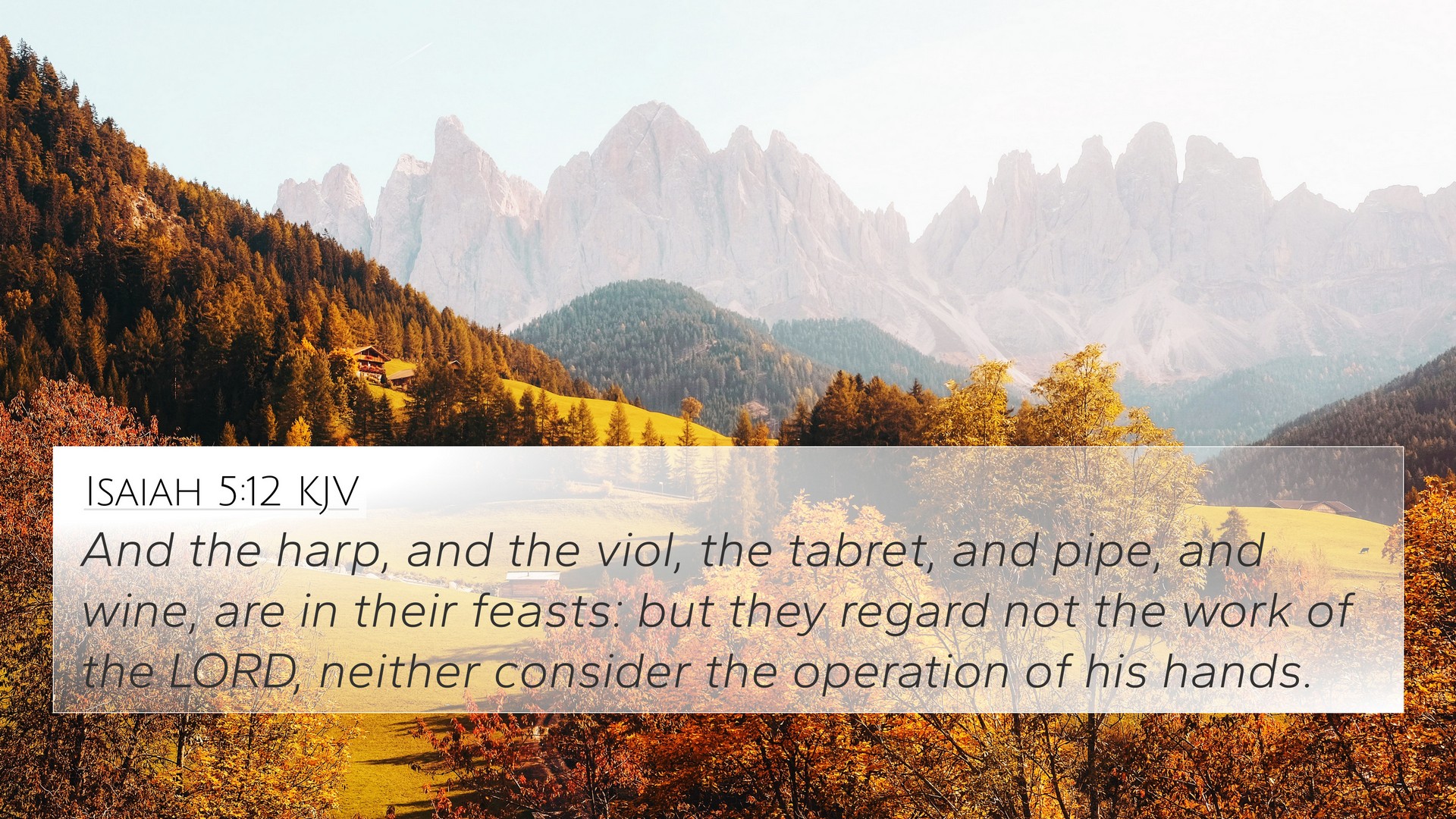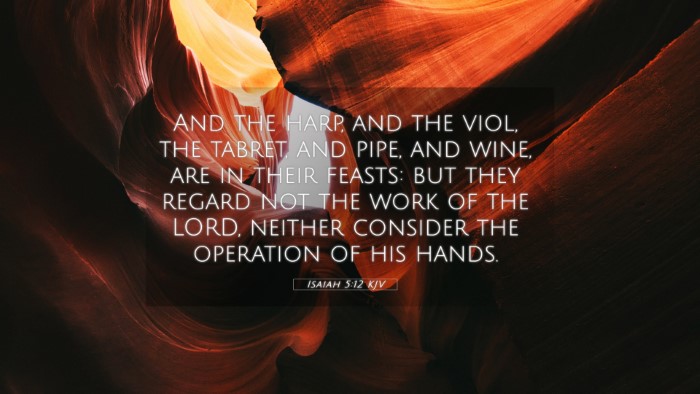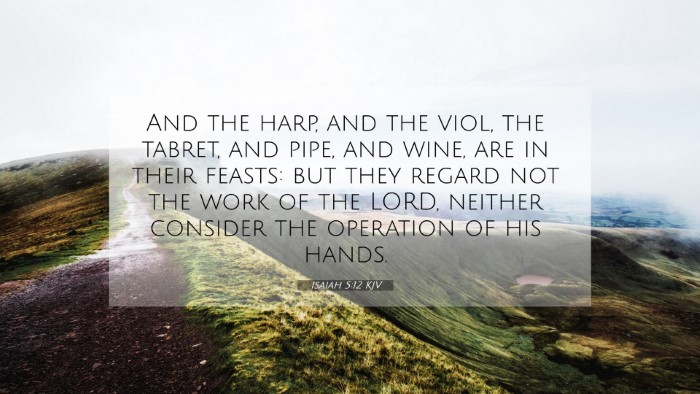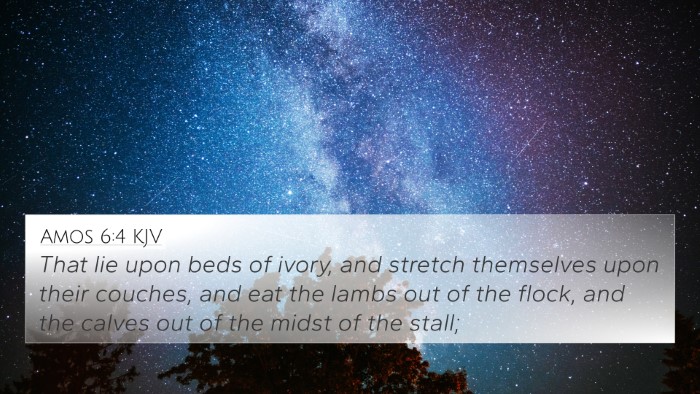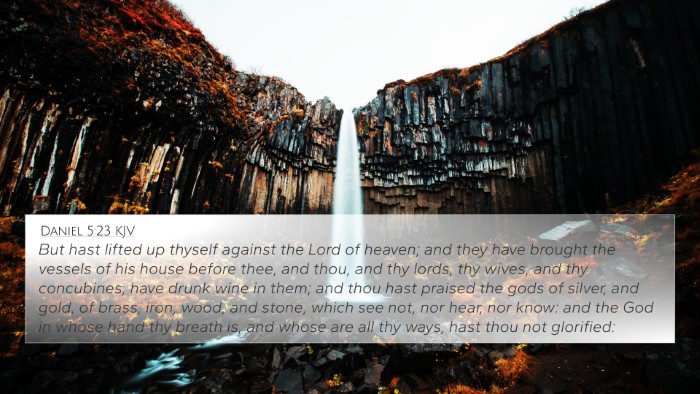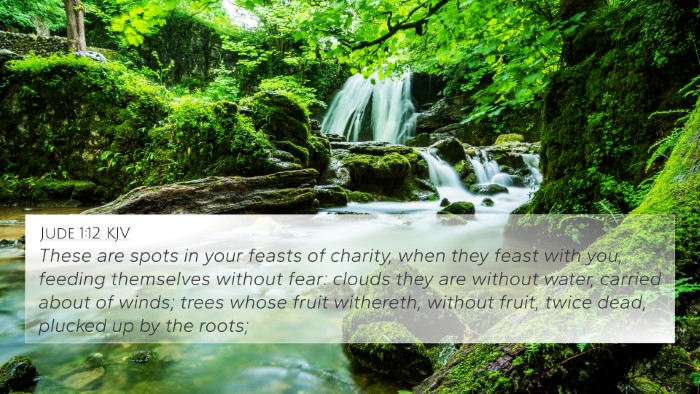Understanding Isaiah 5:12
Isaiah 5:12 states: "And the harp, and the viol, the tabret, and pipe, and wine, are in their feasts: but they regard not the work of the Lord, neither consider the operation of his hands."
This verse highlights a critical observation of the people of Israel during the time of Isaiah. It addresses their indulgence in pleasure and festivities, contrasted with their neglect of God’s works. In this context, the verse serves as a warning on the dangers of being overly distracted by earthly enjoyments.
Commentary Insights
Matthew Henry's Commentary
According to Matthew Henry, this verse illustrates the folly of the people who are absorbed in their celebrations and music while ignoring divine affairs. The mention of various instruments signifies their exuberance, yet their hearts are far from the truths of God. Henry emphasizes that this neglect leads to a spiritual blindness affecting their lives.
Albert Barnes' Notes
Albert Barnes notes that the feasting and joyful sounds reflect a nation that is spiritually impoverished despite their outward successes. He points out that rather than acknowledging God's sovereignty and judgment, they are preoccupied with their own pleasures, thereby inviting divine consequences. The lack of consideration for God's work underscores a deeper moral and spiritual crisis.
Adam Clarke's Commentary
Adam Clarke adds that this indulgence in musical and celebratory expressions illustrates the priority given to carnal delights over spiritual engagement. He emphasizes that the focus on temporal enjoyment detracts from the recognition and acknowledgment of God’s mighty acts, resulting in a community disconnected from divine authority.
Cross-References
This verse can be cross-referenced with several others that reflect similar themes of neglecting God's works in favor of worldly pleasures:
- Isaiah 1:12-15 - A call to repentance where God expresses disdain for empty rituals.
- Amos 6:1-6 - A denouncement of those who are complacent in their pleasures, ignoring impending judgment.
- Luke 14:16-24 - The Parable of the Great Banquet, illustrating how people often make excuses to avoid divine invitation.
- James 4:4 - A rebuke against friendship with the world that stands in opposition to God.
- Matthew 24:38-39 - The days of Noah where people were engrossed in daily life ignoring the coming deluge.
- Philippians 3:18-19 - Paul's warning against those whose god is their belly, focused on earthly things.
- Ezekiel 33:31 - The people come to Ezekiel for the latest news, but their hearts are far from God.
Thematic Connections
The thematic connection in Isaiah 5:12 with other scripture highlights a recurring Biblical principle: the tension between divine expectations and human indulgence. This reflects a broader narrative found throughout the Old and New Testaments regarding how nations and individuals respond to God's call in the face of distractions.
For those looking to explore connections between Bible verses, consider the following aspects:
- Spiritual Complacency: Isaiah aligns with multiple verses that discuss how people often forget God's works and fall into apathy.
- Warnings Against Idolatry: The indulgence in music and festivity speaks to idolatrous practices that divert attention from God.
- The Call for Repentance: Many prophets call for a return to God, paralleling Isaiah’s message of recognition of divine operation.
Tools for Cross-Referencing
To effectively engage in Bible cross-referencing, there are numerous tools and methods available:
- Bible Concordance: Useful for finding where specific terms and themes appear across scripture.
- Bible Cross-Reference Guide: Helps locate passages related through similar concepts or themes.
- Cross-Reference Bible Study: Engaging with scriptures in this manner enriches understanding and retention of divine truths.
Conclusion
In summary, Isaiah 5:12 serves as a poignant reminder of the necessity of aligning our focus on God and his works over earthly distractions. This verse resonates with the broader narrative of Scripture, encouraging believers to maintain vigilance over their spiritual lives while cultivating a deeper understanding through prayer and scripture study.
